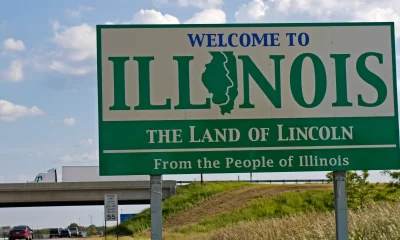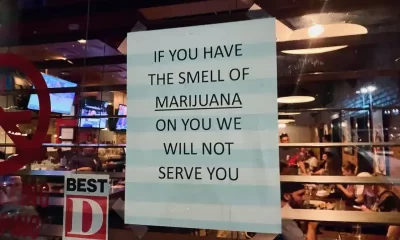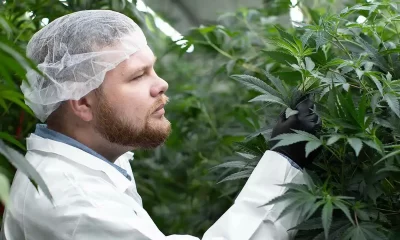Business
Elon Musk Plans To Launch SpaceX Starship Rocket on 4/20

Monday’s planned launch of the Starship rocket was delayed to take place on 4/20
The test flight of SpaceX’s highly anticipated Starship rocket—eventually en route to the moon and Mars—was delayed from its original launch date on Monday and rescheduled for a new day: April 20.
The rocket remains on the launchpad located in Cameron County, Texas, approximately 17 miles east of Brownsville, while engineers get the rocket’s pressurized system ready again, which unexpectedly froze. “A pressurant valve appears to be frozen, so unless it starts operating soon, no launch today,” Musk initially tweeted Monday.
“SpaceX is targeting as soon as Thursday, April 20 for the first flight test of a fully integrated Starship and Super Heavy rocket from Starbase in Texas,” the company posted. “The 62 minute launch window opens at 8:28 a.m. CT and closes at 9:30 a.m. CT.” The fact that it will launch on April 20 is “perhaps inevitable,” Musk tweeted in reply to the announcement.
What makes Starship unique is its fully reusable transportation system designed to carry both crew and cargo to Earth orbit. Musk and the SpaceX team believe that humanity will return to the Moon and travel to Mars. This particular test will help SpaceX improve the probability of success in the future.
“To date, the SpaceX team has completed multiple sub-orbital flight tests of Starship’s upper stage from Starbase, successfully demonstrating an unprecedented approach to controlled flight,” SpaceX wrote. “These flight tests helped validate the vehicle’s design, proving Starship can fly through the subsonic phase of entry before re-lighting its engines and flipping itself to a vertical configuration for landing.”
SpaceX explained why there are so many factors that can delay a space flight.
“In addition to the testing of Starship’s upper stage, the team has conducted numerous tests of the Super Heavy rocket, which include the increasingly complex static fires that led to a full-duration 31 Raptor engine test—the largest number of simultaneous rocket engine ignitions in history. The team has also constructed the world’s tallest rocket launch and catch tower. At 146 meters, or nearly 500 feet tall, the launch and catch tower is designed to support vehicle integration, launch, and catch of the Super Heavy rocket booster. For the first flight test, the team will not attempt a vertical landing of Starship or a catch of the Super Heavy booster.”
A live webcast of the flight test will begin about 45 minutes before liftoff. As is the case with many space-related launches, this schedule is dynamic and likely to change.
“During the next attempt on Thursday, the Super Heavy booster will detach and then make a hard splashdown in the Gulf of Mexico about eight minutes after liftoff. Starship’s upper-stage spacecraft will make a partial lap around Earth, coming down in the Pacific Ocean near Hawaii around 90 minutes after launch,” the report said.
Is the 4/20 date significant? Probably, given Musk’s past five years in the spotlight: On August 7, 2018, Musk tweeted he was mulling over taking Tesla private, quoting a price of $420 per share for the buyout.
He told the New York Times that he’s aware of how popular weed is, but he’s not sure how it could help productivity, to be candid. “It seemed like better karma at $420 than at $419,” Musk said. “But I was not on weed, to be clear.” That all changed a month later on a podcast appearance on The Joe Rogan Experience.
On September 6, 2018, Musk smoked a blunt on episode #1169 of The Joe Rogan Experience. Rogan himself became embroiled in the topic of free speech due to his Spotify fiasco, over concerns the podcaster was sharing information that wasn’t medically sound.
Source: https://hightimes.com/news/elon-musk-plans-to-launch-spacex-starship-rocket-on-4-20/
Business
New Mexico cannabis operator fined, loses license for alleged BioTrack fraud

New Mexico regulators fined a cannabis operator nearly $300,000 and revoked its license after the company allegedly created fake reports in the state’s traceability software.
The New Mexico Cannabis Control Division (CCD) accused marijuana manufacturer and retailer Golden Roots of 11 violations, according to Albuquerque Business First.
Golden Roots operates the The Cannabis Revolution Dispensary.
The majority of the violations are related to the Albuquerque company’s improper use of BioTrack, which has been New Mexico’s track-and-trace vendor since 2015.
The CCD alleges Golden Roots reported marijuana production only two months after it had received its vertically integrated license, according to Albuquerque Business First.
Because cannabis takes longer than two months to be cultivated, the CCD was suspicious of the report.
After inspecting the company’s premises, the CCD alleged Golden Roots reported cultivation, transportation and sales in BioTrack but wasn’t able to provide officers who inspected the site evidence that the operator was cultivating cannabis.
In April, the CCD revoked Golden Roots’ license and issued a $10,000 fine, according to the news outlet.
The company requested a hearing, which the regulator scheduled for Sept. 1.
At the hearing, the CCD testified that the company’s dried-cannabis weights in BioTrack were suspicious because they didn’t seem to accurately reflect how much weight marijuana loses as it dries.
Company employees also poorly accounted for why they were making adjustments in the system of up to 24 pounds of cannabis, making comments such as “bad” or “mistake” in the software, Albuquerque Business First reported.
Golden Roots was fined $298,972.05 – the amount regulators allege the company made selling products that weren’t properly accounted for in BioTrack.
The CCD has been cracking down on cannabis operators accused of selling products procured from out-of-state or not grown legally:
- Regulators alleged in August that Albuquerque dispensary Sawmill Sweet Leaf sold out-of-state products and didn’t have a license for extraction.
- Paradise Exotics Distro lost its license in July after regulators alleged the company sold products made in California.
Golden Roots was the first alleged rulebreaker in New Mexico to be asked to pay a large fine.
Source: https://mjbizdaily.com/new-mexico-cannabis-operator-fined-loses-license-for-alleged-biotrack-fraud/
Business
Marijuana companies suing US attorney general in federal prohibition challenge

Four marijuana companies, including a multistate operator, have filed a lawsuit against U.S. Attorney General Merrick Garland in which they allege the federal MJ prohibition under the Controlled Substances Act is no longer constitutional.
According to the complaint, filed Thursday in U.S. District Court in Massachusetts, retailer Canna Provisions, Treevit delivery service CEO Gyasi Sellers, cultivator Wiseacre Farm and MSO Verano Holdings Corp. are all harmed by “the federal government’s unconstitutional ban on cultivating, manufacturing, distributing, or possessing intrastate marijuana.”
Verano is headquartered in Chicago but has operations in Massachusetts; the other three operators are based in Massachusetts.
The lawsuit seeks a ruling that the “Controlled Substances Act is unconstitutional as applied to the intrastate cultivation, manufacture, possession, and distribution of marijuana pursuant to state law.”
The companies want the case to go before the U.S. Supreme Court.
They hired prominent law firm Boies Schiller Flexner to represent them.
The New York-based firm’s principal is David Boies, whose former clients include Microsoft, former presidential candidate Al Gore and Elizabeth Holmes’ disgraced startup Theranos.
Similar challenges to the federal Controlled Substances Act (CSA) have failed.
One such challenge led to a landmark Supreme Court decision in 2005.
In Gonzalez vs. Raich, the highest court in the United States ruled in a 6-3 decision that the commerce clause of the U.S. Constitution gave Congress the power to outlaw marijuana federally, even though state laws allow the cultivation and sale of cannabis.
In the 18 years since that ruling, 23 states and the District of Columbia have legalized adult-use marijuana and the federal government has allowed a multibillion-dollar cannabis industry to thrive.
Since both Congress and the U.S. Department of Justice, currently headed by Garland, have declined to intervene in state-licensed marijuana markets, the key facts that led to the Supreme Court’s 2005 ruling “no longer apply,” Boies said in a statement Thursday.
“The Supreme Court has since made clear that the federal government lacks the authority to regulate purely intrastate commerce,” Boies said.
“Moreover, the facts on which those precedents are based are no longer true.”
Verano President Darren Weiss said in a statement the company is “prepared to bring this case all the way to the Supreme Court in order to align federal law with how Congress has acted for years.”
While the Biden administration’s push to reschedule marijuana would help solve marijuana operators’ federal tax woes, neither rescheduling nor modest Congressional reforms such as the SAFER Banking Act “solve the fundamental issue,” Weiss added.
“The application of the CSA to lawful state-run cannabis business is an unconstitutional overreach on state sovereignty that has led to decades of harm, failed businesses, lost jobs, and unsafe working conditions.”
Business
Alabama to make another attempt Dec. 1 to award medical cannabis licenses

Alabama regulators are targeting Dec. 1 to award the first batch of medical cannabis business licenses after the agency’s first two attempts were scrapped because of scoring errors and litigation.
The first licenses will be awarded to individual cultivators, delivery providers, processors, dispensaries and state testing labs, according to the Alabama Medical Cannabis Commission (AMCC).
Then, on Dec. 12, the AMCC will award licenses for vertically integrated operations, a designation set primarily for multistate operators.
Licenses are expected to be handed out 28 days after they have been awarded, so MMJ production could begin in early January, according to the Alabama Daily News.
That means MMJ products could be available for patients around early March, an AMCC spokesperson told the media outlet.
Regulators initially awarded 21 business licenses in June, only to void them after applicants alleged inconsistencies with how the applications were scored.
Then, in August, the state awarded 24 different licenses – 19 went to June recipients – only to reverse themselves again and scratch those licenses after spurned applicants filed lawsuits.
A state judge dismissed a lawsuit filed by Chicago-based MSO Verano Holdings Corp., but another lawsuit is pending.
Source: https://mjbizdaily.com/alabama-plans-to-award-medical-cannabis-licenses-dec-1/
-

 Business2 years ago
Business2 years agoPot Odor Does Not Justify Probable Cause for Vehicle Searches, Minnesota Court Affirms
-

 Business2 years ago
Business2 years agoNew Mexico cannabis operator fined, loses license for alleged BioTrack fraud
-

 Business2 years ago
Business2 years agoAlabama to make another attempt Dec. 1 to award medical cannabis licenses
-

 Business2 years ago
Business2 years agoWashington State Pays Out $9.4 Million in Refunds Relating to Drug Convictions
-

 Business2 years ago
Business2 years agoMarijuana companies suing US attorney general in federal prohibition challenge
-

 Business2 years ago
Business2 years agoLegal Marijuana Handed A Nothing Burger From NY State
-

 Business2 years ago
Business2 years agoCan Cannabis Help Seasonal Depression
-

 Blogs2 years ago
Blogs2 years agoCannabis Art Is Flourishing On Etsy













